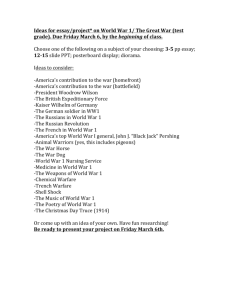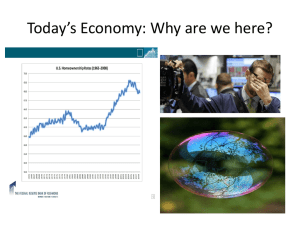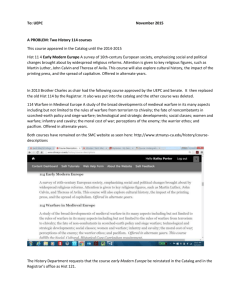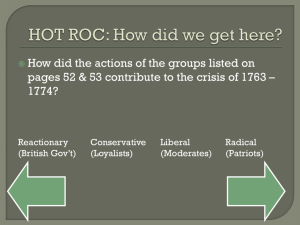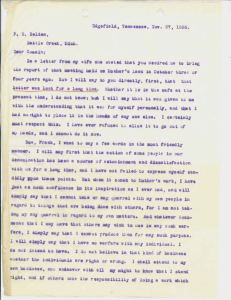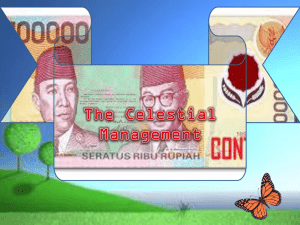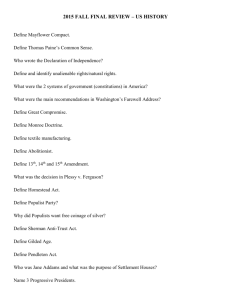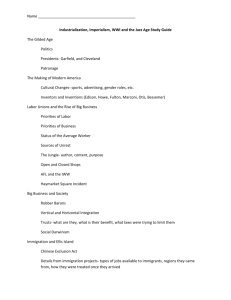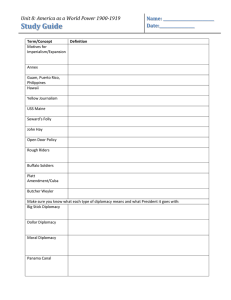THE STATE-PRIVATE NETWORK AND US FOREIGN POLICY
advertisement
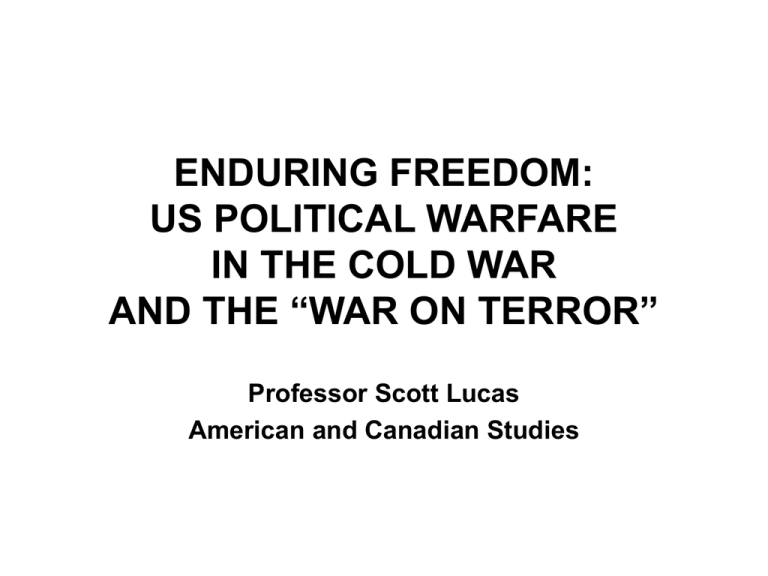
ENDURING FREEDOM: US POLITICAL WARFARE IN THE COLD WAR AND THE “WAR ON TERROR” Professor Scott Lucas American and Canadian Studies PART 1: WHEN CULTURE AND FOREIGN POLICY COLLIDE “As Karen Hughes, longtime presidential adviser and new public diplomacy guru at the State Department, prepares to leave this weekend on a ‘listening tour’ of the Middle East, a congressionally mandated advisory panel to the department warned that America’s image and reputation abroad could hardly be worse.” “The panel's report, which has been seen by senior officials but not yet officially released, said a fact-finding mission to the Middle East last year found that ‘there is deep and abiding anger toward U.S. policies and actions’. The Advisory Committee on Cultural Diplomacy cited polling that found that large majorities in Egypt, Morocco and Saudi Arabia "view George W. Bush as a greater threat to the world order than Osama bin Laden.” (Washington Post, 24 September 2005) QUESTION: WHY IS THERE A CONTINUING TENSION BETWEEN THE PROJECTION OF “AMERICA” AND ITS RECEPTION BY PEOPLES OF OTHER COUNTRIES? America's image problem is not only regional. It is global. (Council on Foreign Relations, July 2002) A fundamental problem of credibility….The United States today is without a working channel of communication to the world of Muslims and of Islam (Defense Science Board, December 2004) • “I'm amazed that there is such misunderstanding of what our country is about that people would hate us. I, like most Americans, I just can't believe it, because I know how good we are.” • George Bush, 14 October 2001 PART 2: U.S. STRATEGY, THEN AND NOW: THE ENEMY AND THE CONCEPT OF “POLITICAL WARFARE” • “Political warfare is the employment of all the means at a nation's command, short of war, to achieve its national objectives.” “Understanding the concept of political warfare, we should also recognize that there are two major types of political warfare--one overt and the other covert…. Having assumed greater international responsibilities than ever before in our history and having been engaged by the full might of the Kremlin's political warfare, we cannot afford to leave unmobilized our resources for covert political warfare. (George Kennan, Director of Policy Planning, State Department, May 1948) A. POLITICAL WARFARE TRIES TO UNIFY METHODS • 1. “Soft” and “Hard” Power • 2. Overt and Covert Operations B. POLITICAL WARFARE TRIES TO UNIFY SPHERES OF ACTIVITY: “STATE” AND “PRIVATE” “What is proposed here is an operation in the traditional American form: organized public support of resistance to tyranny in foreign countries. Throughout our history, private American citizens have banded together to champion the cause of freedom for people suffering under oppression.” (George Kennan, ”The Inauguration of Organized Political Warfare”, May 1948) D. POLITICAL WARFARE IS A TOTAL CAMPAIGN 1. Military 2. Economic 3. Cultural/Ideological 4. Media and Propaganda (Official and “Unofficial”) “We must pool our efforts with those of the other free peoples in a sustained, intensified program to promote the cause of freedom against the propaganda of slavery. We must make ourselves heard around the world in a great campaign of truth.” President Harry Truman, 1950 PART IV THE TENSIONS A. Militarisation (from 1950) “No automatic means of ‘stopping communism’ on our part, particular where it is primarily a matter of men’s minds. Military occupation or direct military action not always fool-proof remedy, and not even seriously advocated for most of Asia --- even by strongest critics of our policy.” (George Kennan to Secretary of State Dean Acheson, 6 February 1950) “The ability to perform these tasks (of foreign policy) requires a build-up of military strength by the United States and its allies to a point at which the combined strength will be superior for at least these tasks, both initially and throughout a war, to the forces that can be brought to bear by the Soviet Union and its satellites.” (NSC 68, April 1950) B. The Limits of Soft Power HUNGARY 1956 CHINA CUBA C. The Breakdown of the Cold War Framework VIETNAM IRAN LEBANON D. The Conflict Between Power and Liberation (“Freedom”) “We have about 50% of the world's wealth but only 6.3% of its population. This disparity is particularly great as between ourselves and the peoples of Asia. In this situation, we cannot fail to be the object of envy and resentment. Our real task in the coming period is to devise a pattern of relationships which will permit us to maintain this position of disparity without positive detriment to our national security. To do so, we will have to dispense with all sentimentality and day-dreaming; and our attention will have to be concentrated everywhere on our immediate national objectives. (George Kennan, February 1948) “To attempt evasion of an obvious ideological issue is (1) objectively, to yield much of the field of conflict to our adversaries and (2) subjectively, to subvert our own ideological integrity --- that is, deny subconsciously heritage and philosophic concepts which are inner reasons that we are, for all our shortcomings, not only great but good, and therefore a dynamic force in the mind of the world. (Policy Planning Staff, May 1949) PART V THE POST-COLD WAR REVIVAL: POLITICAL WARFARE OR MUCH MORE? A. The Invocation of Freedom “Freedom is the non-negotiable demand of human dignity; the birthright of every person in every civilization. Throughout history, freedom has been threatened by war and terror; it has been challenged by the clashing wills of powerful states and the evil designs of tyrants; and it has been tested by widespread poverty and disease. Today, humanity holds in its hands the opportunity to further freedom's triumph over all these foes. The United States welcomes our responsibility to lead in this great mission.” (National Security Strategy 2002) B. Tragedy and Possibility: 11 September 2001 “How do we capitalize on these opportunities?” (National Security Advisor Condoleezza Rice to National Security Council staff) “[I want] best info fast. Judge whether good enough hit S.H. [Saddam Hussein] at same time. Not only UBL [Osama bin Laden]. Go massive. Sweep it all up. Things related and not.” (Secretary of Defense Donald Rumsfeld to staff, 12 September 2001) C. Public Diplomacy and Political Warfare “The much discussed potential of public diplomacy to address anti-American sentiment is vitally important at a time when terrorism is such a worldwide threat and uncertainty is pervasive. In the struggle of ideas, public diplomacy is a critical component, a rapid and flexible capability for U.S. diplomacy abroad directed at improving understanding of and support for U.S. policy, encouraging and empowering moderates, and discrediting intolerance.” (State Department Strategic Goal 11: Public Diplomacy and Public Affairs, 2004) This is definitely the most elegant brand I--I've ever had to work with, and I have a lot of facets of the brand. First it's President Bush and Secretary Powell embodying the brand. That's a pretty inspiring place to start. Advertising executive Charlotte Beers, on being appointed as Assistant Secretary of State for Public Affairs, 7 November 2001 As Shahed Amanullah, an engineer who lives in San Francisco, California, puts it, " American values are, by and large, very consistent with Islamic values, with a focus on family, faith, hard work, and an obligation to better self and society.“ PART 6 THE TENSIONS, CHAPTER TWO “They could have the prophet Muhammad doing public relations and it wouldn't help.” (Osama Siblani, publisher of Arab-American News) A. Militarisation and “Hard Power” “As much as I would love the Iraqis to love me, and my doctrine tells me that I want to win the hearts and minds, I know I’m not going to do that.” (Lieutenant General Thomas Metz) B. The Conflict of Power and Liberation (“Freedom”) “Our first objective is to prevent the re-emergence of a new rival. This is a dominant consideration underlying the new regional defense strategy and requires that we endeavor to prevent any hostile power from dominating a region whose resources would, under consolidated control, be sufficient to generate global power. These regions include Western Europe, East Asia, the territory of the former Soviet Union, and Southwest Asia.” (Assistant Secretary of Defense Paul Wolfowitz, 1992 Defense Planning Guidance) The Bush Administration: Iraq as Example “Powell began by discussing the new strategy for ‘targeted sanctions’. But after a moment Rumsfeld interrupted. ‘Sanctions are fine,’ he said. ‘But what we really want to think about is going after Saddam. Imagine what the region would look like without Saddam and with a regime that's aligned with U.S. interests. It would demonstrate what U.S. policy is all about.’” (Secretary of Treasury Paul O’Neill referring to 1 February 2001 National Security Council meeting) “The great strength of this nation must be used to promote a balance of power that favors freedom.” (National Security Strategy 2002) “The Iraqis had flowers in their minds.” (Assistant Secretary of Defense Douglas Feith) “We’re trying to save their lives but they’re not helping us by getting in our way.” (US military officer) “Freedom’s untidy.” (Donald Rumsfeld, April 2001) PLAYING FOOTBALL AND GROWING BEARDS IN FALLUJAH In early 2004, US Marines were sent into the Fallujah area to replace Army units which had been, in the words of Marine spokesmen, “too heavy-handed” in their treatment of the Iraqi population. To win local favour, the Marines grew beards and set up football games. At the start of April, the Marines shaved off their beards and all football games. In the next two weeks, more than 700 Iraqis died in Fallujah. C. The Limits of “Soft Power” “A group of Turkish women's rights activists confronted Undersecretary of State Karen Hughes on Wednesday with emotional and heated complaints about the U.S.-led invasion of Iraq, turning a session designed to highlight the empowering of women into a raw display of the anger at U.S. policy in the region. "This war is really, really bringing your positive efforts to the level of zero," said Hidayet Sefkatli Tuksal, an activist with the Capital City Women's Forum. She said it was difficult to talk about cooperation between women in the United States and Turkey as long as Iraq was under occupation. (Washington Post, 29 September 2005)
